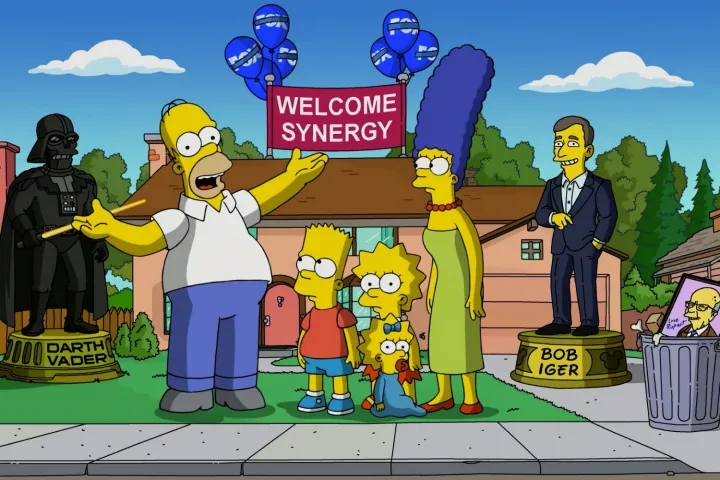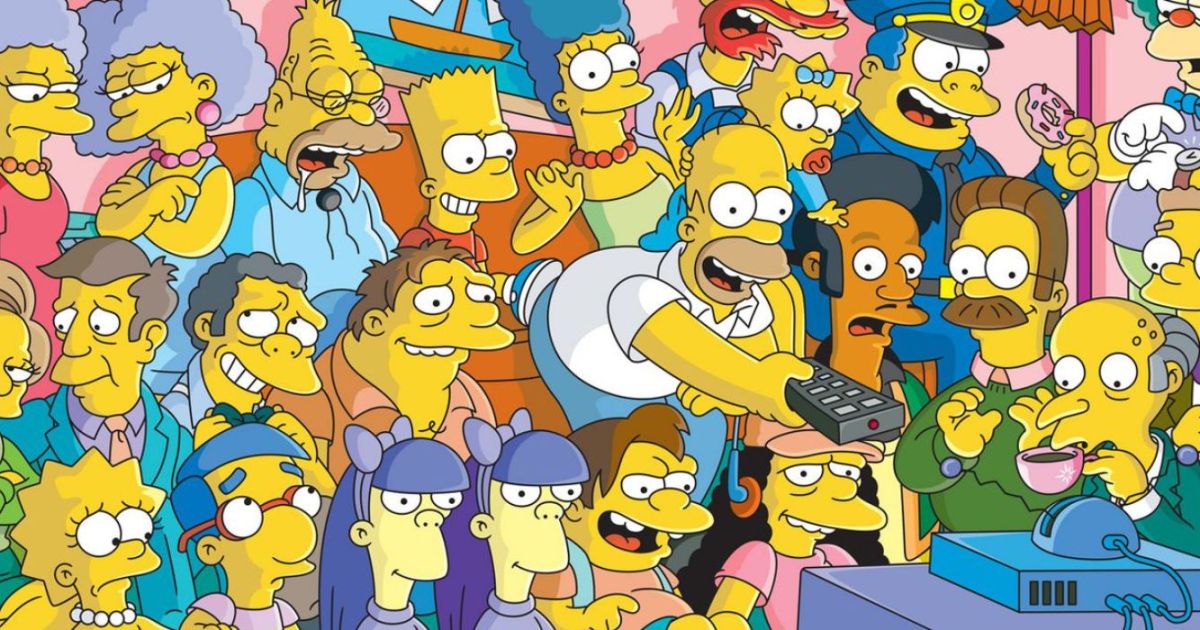The Simpsons has been on the air for so long now that it practically is the air. After 35 seasons and counting, there’s a little of Matt Groening’s apparently immortal animated sitcom in every breath of pop culture we take. But if TV’s longest-running scripted comedy has felt like a constant for ages, it really became one in the summer of 2014. Suddenly, a show you could expect to always be on in a general sense was literally always on — 24 hours a day for just shy of two weeks.
Ten years ago today, the “Every.Simpsons.Ever.” marathon began, inviting everyone to bask in television’s warm glowing warming glow. From the morning of August 21, 2014, the cable network FXX aired the entire run of The Simpsons up to that point — all 552 episodes, plus The Simpsons Movie, in order and interrupted only by commercial breaks. The event lasted for about 12 days straight. It was, at the time, the longest consecutive TV marathon ever. (VH1 Classics would break that record a mere few months later with an unbroken block of Saturday Night Live reruns.)

The marathon marked FXX’s acquisition of the broadcast rights to The Simpsons — a white whale in syndication, thanks to a long-standing deal that gave Fox affiliates exclusive permission to run old episodes until the show ended. (Turns out no one involved anticipated just how hypothetical the prospect of The Simpsons ever ending would turn out to be.) Every.Simpsons.Ever. was a massive success for the fledgling network, tripling its audience overnight and drawing more eyeballs throughout those 12 days than almost anything else concurrently on cable.

Of course, most people didn’t watch continuously. They dipped in and out. The marathon was like the Olympics. You could turn on your TV at all hours of the day and night, confident that the misadventures of Springfield’s first family would be waiting for you. For a fortnight, The Simpsons was just… on.
Any old-school Simpsons fan could tell you the marathon was frontloaded. Over its first five days, switching the channel to FXX all but guaranteed you a primetime classic. Last Exit to Springfield, sometimes cited as the show’s zenith, aired at 11:30 p.m. ET on Friday night — a direct challenge to social lives and weekend plans everywhere. If you had a meeting that morning, you risked missing the star-studded Flaming Moe’s. If you went to church on Sunday, you were choosing God over steamed hams. It was pretty much nothing but big laughs the first weekend. If you wanted to experience the episode many (incorrectly) think of as the end of the show’s Golden Age, you had to stay up until 3:30 a.m. on Monday morning, when the marathon reached season 9’s misunderstood The Principal and the Pauper.

Every.Simpsons.Ever. was also an excuse to catch up on The Simpsons. If you jumped ship somewhere along the way, you could dip into the marathon and see where the show had gone (and maybe where it had gone wrong) in the years since. By season 25, it had been inessential for almost twice as long as it had been essential. That, anyway, was the conventional wisdom that hung over The Simpsons in what we must now identify as its middle age. Had the show improved at all since it stopped looking like the funniest comedy on TV? Were there hidden gems scattered across its later seasons? The marathon offered lapsed fans a chance to find out — a convenient opportunity to see if a scorned favorite deserved a second chance.

Even if the bulk of this full Simpsons replay didn’t do its back half any big favors, it did offer a long view on the creative and narrative trajectory of the show. You could see the animation evolve in front of you over a few hours, time-lapse style, as the primitive sketchings of that first season gave way to a more polished, computer-abetted aesthetic. The uncredited celebrity guest spots of the salad days are gradually replaced by a line of big names eager to have their egos stroked. And the show’s relationship to reality gradually loosens, too: If you tuned into the marathon Thursday and then went back to it on Saturday, you’d see a working-class schlub with constant money troubles suddenly orbiting the planet in a NASA shuttle.

The Simpsons themselves don’t really change. They’re the actual constant of the series — ageless, timeless, set in their ways and personalities. But the world around them changes. (Remember when the family got a computer? How about when Bart and Lisa got smartphones?) The supporting characters change, too. Over 25 seasons, Apu went from swinging bachelor to tentative newlywed to stressed father of octuplets. (If the marathon happened four years later, we’d also see him recede into the background, as Hank Azaria stepped away from the character he voiced for literal decades.) Ned Flanders becomes a widower. Patty comes out of the closet. Milhouse’s parents split up. Every.Simpsons.Ever. showcased these developments end to end, squashing 25 years of storytelling into mere days.
The biggest winner of the marathon wasn’t FXX, it was The Simpsons itself. In some intangible but nonetheless noticeable way, this highly-rated TV event seemed to reignite passion for the show. Former fans got a reminder of why they fell in love with these characters in the first place. Younger viewers who grew up after the show’s heyday could find out what all the fuss was about. Recent years have seen reputation of nu-Simpsons rebound a little, with some making the case that the undying series is, in fact, good again. One has to wonder if Every.Simpsons.Ever. kickstarted that conversation — or, at the very least, if it got people paying attention again to a small-screen institution they wrote off years earlier.

Today, the marathon also looks like a last gasp of a certain kind of endangered communal pop-culture experience. The way people watch TV has shifted a lot in 10 years. That sea change was already underway in 2014, one year after Netflix’s successful first foray into original content and the move toward streaming as an increasingly popular alternative to cable. In 2019, Fox would be absorbed by Disney, and all of The Simpsons would become available on Disney+. Airing every episode on TV now seems like a quaint relic of a different age. Who needs a full marathon when you can binge a show on your own timeline? Your own personal Every.Simpsons.Ever. is now a modem and a monthly subscription fee away.

But the excitement of those 12 days of all Simpsons all the time can’t really be replicated via streaming. It was this special thing, an anomaly of a new media age. It cut through the option paralysis and divided attentions of the streaming era in the way only big events, like the Super Bowl or the Oscars, still do. For one brief, magical stretch of late summer, we were watching TV together like we used to. And what else could get everyone on the same channel like that again but The Simpsons?
For more of A.A. Dowd’s writing, visit his Authory page.
